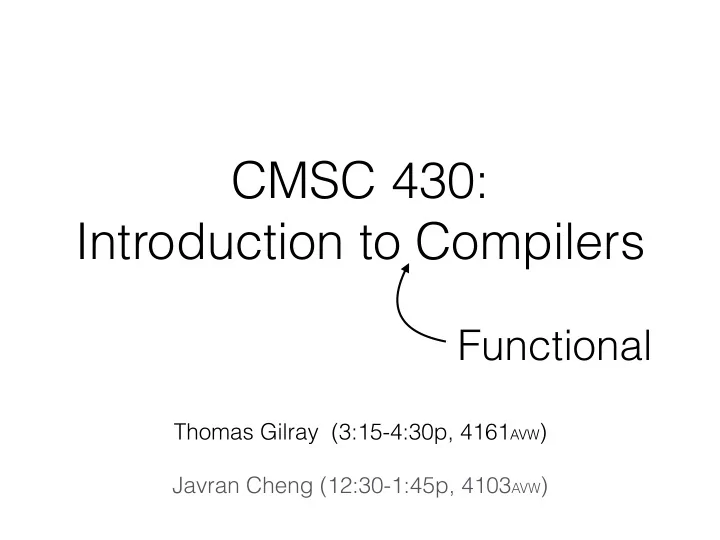

CMSC 430: Introduction to Compilers Functional Thomas Gilray (3:15-4:30p, 4161 AVW ) Javran Cheng (12:30-1:45p, 4103 AVW )
cs.umd.edu/class/fall2017/cmsc430
Why take compilers?
Sapir-Whorf Hypothesis At least true for programming languages…
Why take compilers? • Likewise, learning how the compiler thinks makes you a better programmer. • Can make smarter use of existing compilers. • Will apply many of the same principles elsewhere. • You may eventually work on a smaller language, or perhaps even a large one. • Avoid introducing something indecent into the world…
Such as equality semantics in PHP…
Lexing Parsing Macros/preprocessing Intermediate representation (IR/IL) Smaller IR Tiny IR (admin bindings) Static single assignment (SSA) Register allocation Code emission (asm)
Lexing Parsing Macros/preprocessing Intermediate representation (IR/IL) Smaller IR Tiny IR (admin bindings) Static single assignment (SSA) Register allocation Code emission (asm)
Lexing evaluate Parsing Macros/preprocessing Intermediate representation (IR/IL) result = result ’ Smaller IR Tiny IR (admin bindings) Static single assignment (SSA) Register allocation Code emission (asm)
Lexing Parsing Macros/preprocessing Closure conversion } Intermediate representation (IR/IL) Smaller IR Tiny IR (admin bindings) Assignment conversion Static single assignment (SSA) Continuation-passing style conversion Register allocation Code emission (asm)
The big idea:
λ Compile well
Then compile almost everything into λ
λ - calculus Alonzo Church
LISP John McCarthy
Scheme Guy Steele Gerald Jay Sussman
Scheme “ I should not design a small language, and I should not design a large one. I need to design a language that can grow. ” Guy Steele Gerald Jay Sussman Growing a language. (1998)
PLT Scheme -> Racket Matthias Felleisen Matthew Flatt (et al.)
Symbolic expressions (s-expr) ( ... )
(tag children ...)
Textual encoding for lists/trees
<tag> children ... </tag>
<tag id=“child” ...> children ... </tag>
(tag ([id child] ...) children ...)
(xexpr->xml ‘(tag ([id child] ...) children ...)) “<tag id=\“child\” ...> children ... </tag>”
let rec fact n = if n <= 1 then 1 else n * fact (n - 1) ...
let rec fact n = if n <= 1 then 1 else n * fact (n - 1) ... let rec fact n if ... <= * 1 n n apply 1 fact - n 1
let rec ... fact n if <= * 1 n n apply 1 fact - (letrec ([fact n 1 ( λ (n) (if (<= n 1) 1 (* n (fact (- n 1)))))]) ...)
This week. • Download and install Racket 6.10 • Try out DrRacket IDE and the cmd-line Racket REPL. • Try examples and start learning the language. It will simply take some time using the language to learn it. • Warm-up assignment 0 is online now. Due Mon, 9/4. • Use submit.cs.umd.edu to submit. Start early.
Let’s try some Racket.
Recommend
More recommend